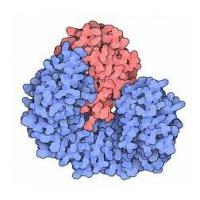Ribonuclease

Product description:Ribonuclease (commonly abbreviated RNase) is a type of nuclease that catalyzes the degradation of RNA into smaller components. Ribonucleases can be divided into endoribonucleases and exoribonucleases, and comprise several sub-classes within the EC 2.7 (for the phosphorolytic enzymes) and 3.1 (for the hydrolytic enzymes) classes of enzymes.
Function:All organisms studied contain many RNases of many different classes, showing that RNA degradation is a very ancient and important process. As well as cleaning of cellular RNA that is no longer required, RNases play key roles in the maturation of all RNA molecules, both messenger RNAs that carry genetic material for making proteins, and non-coding RNAs that function in varied cellular processes. In addition, active RNA degradation systems are a first defense against RNA viruses, and provide the underlying machinery for more advanced cellular immune strategies such as RNAi.
Some cells also secrete copious quantities of non-specific RNases such as A and T1. RNases are, therefore, extremely common, resulting in very short lifespans for any RNA that is not in a protected environment. It is worth noting that all intracellular RNAs are protected from RNase activity by a number of strategies including 5' end capping, 3' end polyadenylation, and folding within an RNA protein complex (ribonucleoprotein particle or RNP).
Another mechanism of protection is ribonuclease inhibitor (RI), which comprises a relatively large fraction of cellular protein (~0.1%) in some cell types, and which binds to certain ribonucleases with the highest affinity of any protein-protein interaction; the dissociation constant for the RI-RNase A complex is ~20 fM under physiological conditions. RI is used in most laboratories that study RNA to protect their samples against degradation from environmental RNases.
Similar to restriction enzymes, which cleave highly specific sequences of double-stranded DNA, a variety of endoribonucleases that recognize and cleave specific sequences of single-stranded RNA have been recently classified.
RNases play a critical role in many biological processes, including angiogenesis and self-incompatibility in flowering plants (angiosperms). Also, RNases in prokaryotic toxin-antitoxin systems are proposed to function as plasmid stability loci, and as stress-response elements when present on the chromosome.
Disclaimer: the information on this website is from the internet for reference only. Please refer to the actual instructions attached to the product and the final interpretation is owned by the company.
 for: Product Quotation ( Product suppliers),COA (Certificate of Analysis), New Sales
for: Product Quotation ( Product suppliers),COA (Certificate of Analysis), New Sales
Promotion,New Products,And any other assistance.
 After send online enquiry, we will reply you as soon as possible, if not get any response on time please contact us by Tel or Email.
After send online enquiry, we will reply you as soon as possible, if not get any response on time please contact us by Tel or Email.
1. Email: sales@aushealthingredients.com
2. Tel: +86 592 536 5868
3. WhatsApp: +86 189 6516 2351
4. Send enquiry online:


